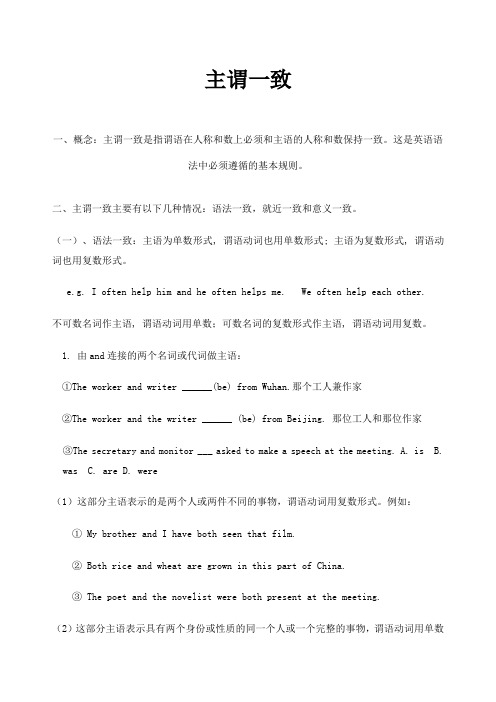主谓一致
高一语法:主谓一致

汉语很难学。
Chinese are very hospitable.
中国人非常好客。
三、谓语动词用单复数均可
3.以-ics 结尾的词作主语时,表示学科时,谓语动 词用单数形式;表示特定事物时,谓语动词用复 数形式。 例如: Statistics is a branch of mathematics.
雅典是希腊的首都。
Good news comes.
好消息来了。
一、谓语动词用单数
8.单个的不定式短语,动名词或名词性从句做主语时,谓 语动词用单数形式。 例如: To see is to believe.
眼见为实。
Reading is important in second language acquisition.
我校有一百多名学生来自南方。
一、谓语动词用单数
5.由each …and each…,every…and every…,many a …and many a …,no…and no…做主语时,谓语动 词用单数形式。 例如: Every boy and every girl was asked to show their identity card.
老年人受到年轻人的尊敬。
The accused is involved in a case.
被告涉嫌了这起案件。
三、谓语动词用单复数均可
5.用and连接的两个名词作主语,表示同一个人或 事物时,谓语动词用单数;表示不同的人或事物 时,谓语动词用复数形式。 例如: The singer and dancer is from Dunhuang.
李明是从那个大学毕业的最聪明的学生。
四、主谓一致的特殊结构
5.主语后带有as well as、along with、together with、 rather than、but、except等引起的介词短语时,谓语动 词的单复数和主语的单复数相一致。 例如: A doctor together with two nurses , has been sent to that poor village to help sick people.
(完整版)英语语法主谓一致

主一致1.主一致是指英中在人称、数及意方面要与作主的名或代一致。
2.主一致分法一致、意一致、就近一致。
(1)法一致原:主和在法形式上保持一致。
主数,用数;主复数,用复数。
I often help him and he often helps me.(2)意一致原:主和在意上复数一致。
主数,用数;主复数,用复数。
The police are searching the woods for the murderer.(3)就近素来原:当主有两个或两个以上,由凑近它的主确定。
并列主的一致1.And(1)两个数名用and 接,表示不同样看法,用复数。
Tom and Jack are close friends.(2)两个数名用 and 接,表示同一歌人、同一个物,同一个看法,或表示不可以切割的整体,用数。
The singer and dancer is to attend our evening party.(3)被 every, each, many a, no 等限制的数名由 and 接,仍用数,其中,后一个限制可以省略。
every ⋯⋯ and ⋯⋯ every,each⋯⋯ and⋯⋯ each,no⋯⋯ and⋯⋯ no, many a⋯⋯ and⋯⋯ manya。
Each boy and (each) girl has an apple.(4)一个数名被几个用 and 接的并列形容修,可以指一件事或几件事,种名作主,要依照意一致的原决定复数。
(5)由 and 接的两个what 的从句作主,要依照意一致的原决定复数What he says and does do not agree.(言不衷心致)What he says and does does not concern me.2.由 either or, neither nor, not but, not only but also,or, nor接的并列主,常和近的主一致。
专升本英语语法---主谓一致

主谓一致一、概念:主谓一致是指谓语在人称和数上必须和主语的人称和数保持一致。
这是英语语法中必须遵循的基本规则。
二、主谓一致主要有以下几种情况:语法一致,就近一致和意义一致。
(一)、语法一致:主语为单数形式, 谓语动词也用单数形式; 主语为复数形式, 谓语动词也用复数形式。
e.g. I often help him and he often helps me. We often help each other.不可数名词作主语, 谓语动词用单数;可数名词的复数形式作主语, 谓语动词用复数。
1. 由and连接的两个名词或代词做主语:①The worker and writer ______(be) from Wuhan.那个工人兼作家②The worker and the writer ______ (be) from Beijing. 那位工人和那位作家③The secretary and monitor ___ asked to make a speech at the meeting. A. is B.was C. are D. were(1)这部分主语表示的是两个人或两件不同的事物,谓语动词用复数形式。
例如:① My brother and I have both seen that film.② Both rice and wheat are grown in this part of China.③ The poet and the novelist were both present at the meeting.(2)这部分主语表示具有两个身份或性质的同一个人或一个完整的事物,谓语动词用单数形式,这时 and 后面的名词前没有冠词。
例:① The st atesman and poet was engaged in warfare all his life.② War and peace is a constant theme in history.③ One more knife and fork is needed.④Bread and butter is our daily food.⑤ Law and order has been established.(3)这部分主语前面有each, every, many a, no 等修饰时,谓语动词一般用单数形式。
主谓一致

主谓一致
3-4两个抽象名词用作主语时 谓语动词用单数或复数均可。例如 两个抽象名词用作主语时, 谓语动词用单数或复数均可。例如: 两个抽象名词用作主语时 • His courage and endurance is (或are) admirable . 他的勇气 或 和耐心令人称赞。 和耐心令人称赞。 • Care and understanding is (或are ) important . 关怀和理解 或 是重要的。 是重要的。 当justice and law(正义与法律 , time and tide(岁月 , fairness 正义与法律) 岁月) 正义与法律 岁月 and impartiality(公正和不偏不倚 等作主语时 故谓语用单数或 公正和不偏不倚)等作主语时 公正和不偏不倚 等作主语时, 复数均可
主谓一致
• 意义一致
• 1)逻辑一致是指谓语动词的形式不取决于主语的表层语法形 ) 而取决于它的深层逻辑含义。虽然一个做主语的名词的形 深层逻辑含义 态,而取决于它的深层逻辑含义。虽然一个做主语的名词的形 式是单数,但如果它表示的是复数的含义 谓语动词也应用复 复数的含义, 式是单数,但如果它表示的是复数的含义,谓语动词也应用复 数形式,反之亦然。 数形式,反之亦然。有时同一个词在不同的语境表示不同的逻 辑意义,则需要依据其含义使用不同的动词形式,应注意体味、 辑意义,则需要依据其含义使用不同的动词形式,应注意体味、 把握不同的动词形式,应注意体味、 把握不同的动词形式,应注意体味、把握不同的动词形式所体 现的主语的确切的逻辑含义:离、金额、重量、面积、体积、容积等 时间、 2-1. 表示时间、距离、金额、重量、面积、体积、容积等 度量的名词短语做主语时, 名词短语做主语时 度量的名词短语做主语时,谓语用单数 Two weeks was too long . Eighty dollars is what she needs . 她需要 美元。 她需要80 美元。 Ten apples is enough . ( = Such a number of apples) •Note: 但若强调这类词组的复数意义, 谓语动词也可用复数 但若强调这类词组的复数意义 形式。例如: 形式。例如 Two hundred tons of water were used last month . 上个月用 吨水。 了200 吨水。 The fifty miles were covered by the winner in three hours . 优胜者花3 小时跑完了50 英里路程。 优胜者花 小时跑完了 英里路程。
主谓一致语法总结

主谓一致语法总结主谓一致指的是主语与动词在人称和数上要保持一致。
在英语语法中,当主语是单数形式时,动词要用第三人称单数形式,而当主语是复数形式时,动词要用复数形式。
这个规则适用于所有时态和语气。
以下是关于主谓一致的总结。
一、基本原则1.在简单句中,主语与动词必须一致。
例子:- The cat sleeps on the sofa.(猫在沙发上睡觉。
)- The birds are singing in the trees.(鸟儿们在树上唱歌。
)2.一般情况下,主语与动词的单复数形式一致。
例子:- My dog likes to play with balls.(我的狗喜欢玩弹球。
)- The students are studying for their exams.(学生们正在为考试而学习。
)3. 当主语为第三人称单数(he、she、it)时,动词要用第三人称单数(-s或-es结尾)。
例子:- She sings beautifully.(她唱得很好听。
)- The cat jumps over the fence.(猫跳过了围栏。
)二、特殊情况1.当主语以复数形式出现,但表示一个整体或一个团体时,动词要用单数形式。
例子:- The team is training for the championship.(团队正在为锦标赛进行训练。
)2.有些名词看上去是复数形式,但实际上是单数形式,动词应该与它们保持单数一致。
例子:- Physics is my favorite subject.(物理是我最喜欢的科目。
)- News travels fast.(新闻传播很快。
)3.复合主语中的多个名词如果表示同一事物或一个整体,动词要用单数形式;如果表示不同事物或多个个体,动词要用复数形式。
例子:- My mother and I are going shopping.(我妈妈和我去购物。
)4.在倒装句中,助动词要与主语保持一致。
主谓一致

1. “More than one + 单形名词”结构虽有复念, 但习惯上多用单数谓语 More than one question was asked.
2. “more +复形名词+than one”多要求复数动词 More members than one have protested against the proposal.
单数形式的名词与谓语动词的一致之 “两个形容词+一个单形名词”
在“两个形容词+一个单形名词”结构中,单 数名词如有复念(即代表两个事物),则 用复数动词
The red and the white rose are both beautiful.
English and French grammar are not very difficult to learn.
主语为复数形式,则谓语动词也用复数形 式。
I often help him and he often helps me.
We often help each other.
二、意义一致
主语形式虽为单数,但意义为复数,则谓 语动词用复数;
主语形式为复数,而意义为单数,则谓语 动词用单数。
The crowd were surrounding the government official. Maths is hard to learn.
This group of students(这一组学生) is to be sent to Italy.
This group of students(这组学生都) are to be sent to Italy.
5. “a number of /numbers of + 复形名词”结构 应用复数动词;而“the number of +复形名词” 结构应用单数动词。
句子的主谓一致及其注意事项

句子的主谓一致及其注意事项一、什么是主谓一致?在中文语法中,主谓一致指的是主语和谓语之间在人称和数上保持一致。
简单来说,就是当主语为单数时,谓语动词要用单数形式;当主语为复数时,谓语动词要用复数形式。
例如:1. 她喜欢读书。
(主语为单数,谓语动词用单数形式“喜欢”)2. 他们喜欢读书。
(主语为复数,谓语动词用复数形式“喜欢”)二、主谓一致的注意事项1. 一些特殊情况下,需要注意主谓一致的几个特殊规则:①当主语由两个或多个名词作并列连接时,谓语动词的数应与靠近它的名词保持一致。
例如:他和我都去了。
(主语由“他”和“我”两个名词作并列连接,谓语动词用复数形式“去”)②当主语是“either...or...”、“neither...nor...”结构时,谓语动词的数根据靠近它的名词来决定。
例如:要么你走,要么我走。
(主语为“要么你”,谓语动词用单数形式“走”)既不他走,也不我走。
(主语为“既不他”,谓语动词用单数形式“走”)③当主语是“not only...but also...”结构时,谓语动词的数应根据靠近它的名词来决定。
例如:他不仅学习好,而且运动好。
(主语为“他”,谓语动词用单数形式“学习好”)2. 当主语是“each”、“every”、“no”等表示单数的词时,谓语动词要用单数形式。
例如:每个学生都应该遵守校规。
(主语为“每个学生”,谓语动词用单数形式“应该遵守”)3. 当主语是以“everybody”、“someone”、“nobody”等作为代词时,谓语动词要用单数形式。
例如:每个人都应该尊重他人。
(主语为“每个人”,谓语动词用单数形式“应该尊重”)4. 当主语是以“many a”、“a lot of”、“the majority of”等短语作为词组时,谓语动词的数要根据短语中的名词来决定。
例如:许多学生喜欢音乐。
(主语为“许多学生”,谓语动词用复数形式“喜欢”)5. 注意主谓一致在被动语态中的表现:在被动语态中,谓语动词的数要根据主语来决定,与之前的主谓一致规则一样。
主谓一致

主谓一致一、主谓一致概述1、主谓一致的定义:谓语动词必须和主语在人称和数上同主语保持一致,叫做主谓一致。
2、主谓一致的原则分类:①语法形式一致原则:在语法形式上取得一致。
如:主语为单数形式,谓语动词用单数;主语为复数形式,谓语动词也采用复数形式。
②逻辑意义一致原则:谓语动词的单复数取决于主语所表达的内在涵义。
③就近一致原则:谓语动词的数随最近的主语而定,又称为毗邻一致原则。
二、主谓一致考点纵览知识点考点考点对应典型例题剖析考点一:语法形式一致的原则考点1:以单数名词或代词、动词不定式短语、动名词短语或从句作主语时,谓语动词用单数。
典型例句Much land has been deserted in this area in the past few years. 在过去的几年中,这个地区的许多土地已经沙化。
To start smoking is quite easy, but to give it up needs courage. 开始吸烟很容易,但是要戒烟却需要勇气。
Reading English newspapers is a good way of improving your English. 阅读英文报纸是提高你英语水平的好方法。
What you need most is to have a good sleep. 你所需要的就是好好睡一觉。
How you can get there is a problem. 你怎么到那儿去还是个问题。
考点2:由and或both...and来连接并列主语时,谓语动词用复数。
典型例句Swimming and walking are good exercises. 游泳和散步都是好运动。
He and I were classmates when we were at college. 他和我在上大学时是同学。
Both John and Ann have got pen-friends. 约翰和安都有笔友。
- 1、下载文档前请自行甄别文档内容的完整性,平台不提供额外的编辑、内容补充、找答案等附加服务。
- 2、"仅部分预览"的文档,不可在线预览部分如存在完整性等问题,可反馈申请退款(可完整预览的文档不适用该条件!)。
- 3、如文档侵犯您的权益,请联系客服反馈,我们会尽快为您处理(人工客服工作时间:9:00-18:30)。
主谓一致练习题主语和谓语在意义上的一致( )1. The teacher and singer ____ us music. W e all like her very much. A. teach B. teaches C. are teaching D. have taught( )2. ---Who ____ going to come right now? ---The police ____. A. is, is B. are, are C. is, are D. are, is( )3. ---How much do I pay for it? ---Ten dollars ____ enough. A. is B. am C. are D. be( )4. Chinese ____ by the largest number of people. A. is speaking B. speak C. speaks D. is spoken( )5. ---Aare you going to have a sports meeting this term? ---Y es. But when to have it ____ not been decided. A. is B. are C. has D. have ( )6. A message sent between computers ____ an e-mail. A. are B. is C. have D. has( )7. ---There ____ no milk in the fridge. Could you get some for me, Dick? ---All right, Mum. A. is B. are C. was D. were( )8. Ten kilometers ____ way. A. is quite a long B. are quite long C. is a quite long D. are quite a long( )9. Neither of the two brothers ____ with their parents. A. live B. are living C. like to live D. lives( )10.So far, the population of this town ____ 300,000. A. are B. is C. have been D. has been( )11.I think physics ____ maths. A. is so useful as B. are more useful as C. are as useful as D. is much more useful than( )12. ---What ____ the number of the workers in the factory? ---Two thousand. And a large number of them ____ women.A. is, isB. is, areC. are, isD. are, are( )13. ---____ this pair of shoes yours? ---No. My shoes ____ under the bed. A. Is, is B. Are, are C. Is, are D. Are, is( )14. His family ____ in this city since his father found work here. A. have been B. have come C. has lived D. began to live( )15. The Chinese ____ hard to turn the country into a strong and beautiful one. A. is working B. works C. has always worked D. are working ( )16. In the city the old ____. A. take good care of B. are taken good care of C. is taken good care of D. are been taken good care of ( )17. The Greens ____ getting ready for the journey. A. is B. can be C. has been D. are( )18. The Chinese people ____ a great and brave people. A. will be B. is C. are D. may be( )19. The worker and writer ____ to visit our school. A. is coming B. are coming C. have come D. was coming( )20. Swimming and running ____ both good for our health. A. are B. is C. were D. was( )21. Three quarters of the earth ____ with water. A. is covered B. are covered C. is covering D. are covering( )22. None of the money ____ his. A. have B. are C. is D. has( )23. One or two days ____ enough for us. A. have B. are C. is D. has主语和谓语在语法上的一致( )1. Neither Susan nor the twins ____ before. A. surfs B. has surfed C. surfed D. have surfed( )2. ---What will you do this weekend? ---W e’ll go swimming if it ____. A. doesn’t rain B. won’t rain C. isn’t raining( )3. The life we were used to ____ greatly since 1992. A. change B. has changed C. changing D. have changed( )4. Everyone except T om and John ____ there when the meeting began. A. are B. is C. were D. was( )5. Look there! Who ____ the young tree? Let’s go and stop him. A. does cut B. is cutting C. cut( )6. W e’ve got two TV sets, but ____ works well. A. any B. both C. either D. neither( )7. ____ Rose ____ Mary has come, I don’t know when they will come. A. Both, and B. Neither, nor C. Either, or D. / , and( )8. Everyone except the twins ____ to the Great W all before. A. has been B. have gone C. has gone D. have been( )9. The children each ____ a computer in class. A. have B. has C. there is D. there are( )10. The headmaster as well as all the teachers ____.A. are having a meetingB. have gone to the museumC. is panting trees on the hillD. were having a party( )11. Each boy and each girl ____ to the teacher carefully now. A. listens B. listen C. are listening D. is listening( )12. ____ of them ____ Y oung Pioneers. A. Two-fives, is B. T wo-fifths, are C. Second-fifth, are D. Two-five, are( )13. ____ wants to travel. A. All family B. The whole family C. All the families D. The all family( )14. The music he played ____ very wonderful. A. is B. sound C. are D. listen( )15. An old woman with her two babies ____ by the road now. A. sits B. is sitting C. are sitting D. was sitting主语和谓语就近一致( )1. In our school library there ____ a number of books on science and the number of them ____ growing larger and larger.A. is, areB. are, isC. has, isD. have, are( )2. ---Here ____ some flowers for you with our best wishes. ---Thank you. A. is B. am C. are D. be( )3. Sorry, we already have four people in the car, so there ____ for this box.A. is a little roomB. are no roomsC. is little roomD. are few rooms( )4. The teacher and the students ____ on very well with each other. A. gets B. get C. getting D. is getting( )5. I’m sorry, not you but I ____ wrong. A. is B. are C. am D. be( )6. Don’t worry, there ____ enough food in the fridge. A. is B. are C. have D. has( )7. There ____ a lot of fruit trees near the village. A. is B. have C. lies D. stand( )8. Not only the children but also their mother ____ to go to the park. A. want B. wants C. to want D. is wanting ( )9. Neither Jim nor Mike ____ Chinese. They want to learn it. A. know B. knows C. knew D. will know ( )10. There ____ twenty-two boys and twenty girls in our class. A. is B. are C. have D. has( )11. There ____ a car and two jeeps behind the house. A. is B. are C. have D. has( )12. Here ____ two oranges and some milk. A. is B. are C. have D. was( )13. Either you or he ____ to stay at home this afternoon. A. have B. had C. is D. has( )14. Neither he nor I ____ a student now. A. is B. are C. am D. will be( )15. ____ Lucy or you called me? A. Has B. Have C. Is D. Did。
